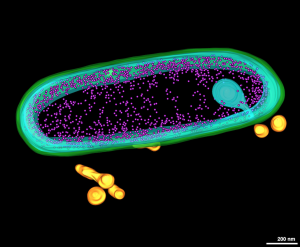
Clinical Study Provides Preliminary Evidence for a Reduction in Irritability With Requiring a Change in Diet
— A. Stewart Campbell, PhD, Axial Therapeutics CEO and Head of R&D.
SYDNEY, NSW, AUSTRALIA, May 19, 2023/EINPresswire.com/ — – Many children living with Autism Spectrum Disorder (ASD) have clear food preferences that prevent them from trying new foods
– Research supports the link between the gut microbiome and irritability in children and teens living with ASD
– The Tapestry Study does not require dietary changes for participants, but instead provides an exploratory medication which absorbs specific microbial metabolites in the gut and stops them entering the bloodstream
– This medication was shown to be safe and well tolerated in a previous study
– Recruitment is now open for the next stage of the clinical trial – taking place in the Australia, New Zealand and the United States
– Participants need to be aged 5-17, have already been diagnosed with Autism Spectrum Disorder (ASD) and be highly irritable
Many parents struggle to introduce new foods to children, and for families with children and teens living with Autism Spectrum Disorder (ASD), this goal is often exponentially more challenging. Many (if not most) children and teens living with ASD will have clear food preferences for colours, textures and tastes, and trying to deviate from these choices can be extremely difficult.
As one mother of a child with Autism explains: ”Autism is very complex – it’s so different for every individual. For my son, all five senses are constantly challenged: visual, hearing, smell, taste and touch. Regulating his emotions around processing his sensory overload can be extremely difficult. You never know which mood he will be in when waking or returning from an activity or what you are walking into. The unpredictability keeps you on your toes and constantly feeling like you are on edge, waiting for the next disaster.”
With so much interest in the gut-brain link over the past decade, many parents of children and teens living with Autism Spectrum Disorder (ASD) may also be curious about whether their child’s restrictive diet may impact their moods or behaviour, or be contributing to gastro-intestinal disturbances. In fact, studies have shown that the bacteria in the gut (the microbiome) of children with ASD differ from other children1, possibly as a consequence of their restricted diet. Children with ASD may also have different levels of metabolites synthesized by these bacteria2 – which could have an impact on irritability.
In fact, a clinical research study previously conducted by Axial Therapeutics has provided preliminary evidence that there is a link between the gut microbiome and the levels of irritability and anxiety in children and teens living with ASD. Now, The Tapestry Study is looking to further explore this link and confirm the treatment effect of AB-2004 with a placebo-controlled trial – the gold standard for proving that a new treatment is effective.
With the study currently underway in Australia, New Zealand and the United States, the study medication (known as AB-2004) is being further explored to understand whether there are improvements in irritability in 5 to 17-year-olds living with ASD compared to placebo. AB-2004 is provided as an odourless and tasteless powder, to be mixed in with any soft food such as yoghurt or pureed apples, 3 times per day. It was shown to be safe and well tolerated in a previous study involving adolescents with ASD and can be added to their existing diet.
For families of children and teens with ASD, managing and coping with irritability and anxiety is an ongoing challenge that can have a significant impact on the quality of daily life.
Irritability and anxiety in children with ASD can be very distressing, as meltdowns or tantrums may impact quality of life for both patients and their families. Sometimes irritability in individuals with ASD can also manifest in other ways, such as destruction of property, self-harm or aggression.
Improving quality of life is the core motivation driving this research. “As we continue to advance AB-2004 through a rigorous clinical development program, the data clearly supports our novel therapeutic strategy focused on specific targets in the gut microbiome. We strongly believe that AB-2004 can improve the quality of life of many children with autism and their families.”, said A. Stewart Campbell, PhD, Axial Therapeutics CEO and Head of R&D.
This clinical trial, which is open to children aged 5-17 years, is actively looking for new participants to take part. Clinics are open in Brisbane, Sydney, Melbourne and Auckland – with new locations across Australia to be announced soon. Visit www.theautismstudy.com for more details, or to see if your child is eligible to enrol.
1. Iglesias-Vazquez et al. (2020) Nutrients 12:792 https://pubmed.ncbi.nlm.nih.gov/32192218/
2. Needham et al. (2021) Biol. Psych. 89:451 https://pubmed.ncbi.nlm.nih.gov/33342544/
About Axial Therapeutics
Axial Therapeutics is a clinical-stage biopharmaceutical company dedicated to improving the lives of people with neurological disorders and conditions. The company is a scientific leader in the biological role of the microbiome-gut-brain axis and its influence on the central nervous system. Axial’s lead product candidate is AB-2004, a molecular therapeutic in Phase 2b clinical trials for the treatment of irritability in children with autism. For more information, visit https://axialtx.com.
About The Tapestry Study
The Tapestry Study is a clinical trial to learn how an experimental treatment may provide a way to improve irritability associated with autism.
The placebo-controlled study is researching an experimental treatment, AB-2004, that is designed to adsorb certain substances produced by bacteria in the gut to reduce their ability to enter the bloodstream and reach the brain. Scientific studies have shown there may be a link between gut bacteria and the brain which could contribute to certain characteristics, such as irritability, in children with ASD.
• AB-2004 is an experimental therapy that is being developed as a potential treatment for irritability associated with autism.
• Formulated as a powder, the medication is to be mixed with any soft food your child may like such as yogurt or apple sauce.
• It is taken 3 times per day and is tasteless and odourless.
• The study is open to children aged 5 – 17 years
• Participation takes around 14-16 weeks
• Visit www.theautismstudy.com for more
Carolyn Miller
The Honeycomb Effect
+61 412 048 253
[email protected]
![]()
Originally published at https://www.einpresswire.com/article/634374780/study-explores-the-gut-brain-link-in-children-and-teens-living-with-autism-spectrum-disorder-asd




